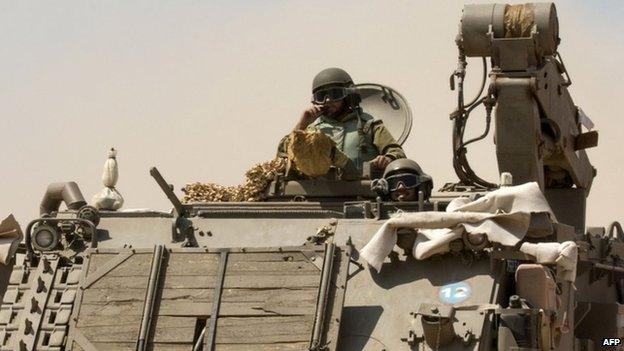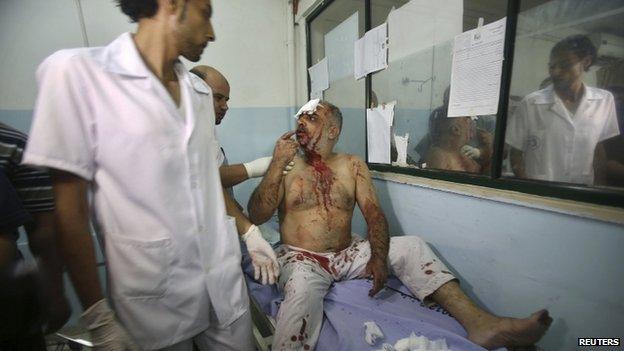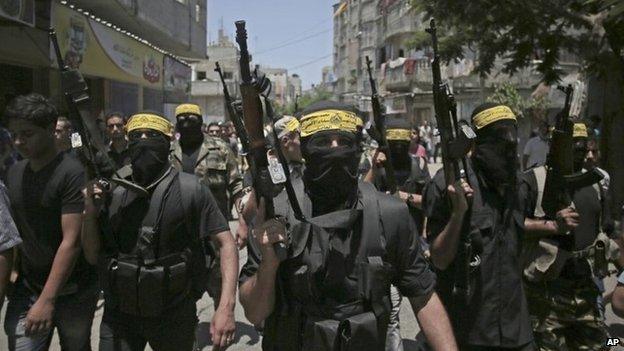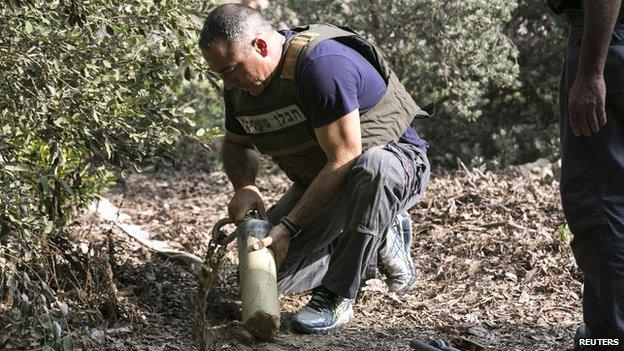Israel launches new air strikes on Gaza Strip
- Published
Footage shows the aftermath of the air strikes on the Gaza strip
Israel has carried out more air strikes on the Gaza Strip, following dozens of rockets fired by the Palestinian Islamist movement Hamas.
At least 15 Palestinians, including two women and a child, were reportedly hurt in the strikes.
Hamas said it fired rockets to respond to "Zionist aggression", after accusing Israel of killing five of its fighters.
Israel denied the claim. It says it has now begun an open-ended aerial operation to end rocket fire from Gaza.
Israel says the operation will be expanded in the coming days and that 1,500 reservists have been called up.
A spokesman for the Israel Defense Forces (IDF) has told the BBC that Israel had the capacity to take its operation "up a notch" and warned that a ground incursion was "not off the table".
That represents a significant strengthening of rhetoric on the Israeli side, says the BBC's Kevin Connolly in Jerusalem.
The sudden escalation has come just days after there was talk of a possible truce between Israel and Gaza with each side suggesting that calm would be answered with calm, our correspondent adds.
Tension has spiked over the murders of three young Israelis and a Palestinian teenager in recent weeks.
Lt Col Peter Lerner: Israel 'no alternative' but airstrikes
Israel says Hamas was behind the abduction and murder of the Israelis in the occupied West Bank - a claim Hamas denies.
A day after their funerals, a 16-year-old Palestinian was abducted and murdered in Jerusalem. Police have arrested six Jewish suspects and say it seems the Palestinian was killed because of his nationality.

The Israeli military has sent reinforcements to the frontier with Gaza

Several Palestinians were injured in the new Israeli air strikes

Militants in Gaza have stepped up rocket attacks on Israel in recent weeks

Israel says it has now begun an open-ended aerial operation to end rocket fire from Gaza
"#IDF has commenced Operation Protective Edge in #Gaza against #Hamas, in order to stop the terror #Israel's citizens face on a daily basis," an IDF spokesperson said in a tweet., external
It said 50 targets were hit throughout the night.

At the scene: Yolande Knell, BBC News, Beit Lahiya, Gaza Strip
There have been several loud thuds in the north Gaza Strip in the past hour as Israeli military planes hit targets here.
The biggest strikes shake the ground and send up huge plumes of smoke.
A woman ran past us with three small children - all were crying and in shock. Nearby a house had just been damaged by an Israeli air raid. Two ambulances whizzed by carrying away the injured.
"They used to launch rockets from here. They [the Israeli defence forces] targeted these houses several times," a local man told us.
It is extremely tense on the streets and most residents - observing the dawn-to-dusk fast for the Islamic holy month of Ramadan - are staying in their homes.

At the scene: James Reynolds, BBC News, Sderot, Israel
Outside a bomb shelter, we heard a loud, dull boom. A small crowd squinted and pointed to a puff of white smoke in the sky.
"It's an interception," says one man, suggesting that Israel's Iron Dome missile defence system had knocked a Hamas rocket out of the sky.
"I'm not happy," said another man, "because even if there's an interception, debris still falls."
At the time of the explosion, Israel's President-elect, Reuben Rivlin, was inside the underground shelter, giving a briefing.
"Is Israel preparing for war with Hamas ?" I asked him.
"We are in war with Hamas because Hamas have declared war on us," he replied. "We are in war - not because of us, because of Hamas."
A little later, Mr Rivlin visited schoolchildren, taking summer classes in a fortified classroom which looked like a bunker.
"We have to hit Hamas hard," said a rabbi.
On the roof of the religious school across the road, a group of students looked out towards Gaza in the distance.

Later on Tuesday morning, the IDF said Hamas had fired at least 16 rockets at Israel, and that its Iron Dome air defence system had intercepted five of them over Ashdod and Ashkelon.
The military also deployed more troops near the Gaza border, reports say. However, the Israeli cabinet stopped short of ordering a ground operation for now.
Towns within 40km (24 miles) of the enclave were instructed by the central authorities to close schools and summer camps because of the threat of rocket fire.
The army said that more rockets were fired into Israel from Gaza.
Hamas said Israel targeted two houses and four training facilities used by the militants across Gaza.
Palestinian medics said 15 people were injured, including two women and a child, in the southern town of Khan Younis.
Hamas militants reportedly warned they would enlarge the radius of their targets if Israel continued with the air strikes.

A Hamas spokesman had earlier accused Israel of killing the five militants during Sunday's air strikes and called it a "grave escalation".
He promised Israel would "pay a tremendous price".
But Israeli military spokesman Lt Col Peter Lerner denied the claims, saying the men had died on Sunday in a tunnel that had been bombarded by Israel on Thursday.
He said the militants went into the tunnel to assess the damage from the air strike and meddled with some explosives, which were apparently detonated accidentally.
Israel said Hamas had launched dozens of rockets on southern and central towns on Monday.
"Seven rockets were intercepted over the [southern] city of Ashdod and five rockets were intercepted over Netivot," an army statement said, according to the AFP news agency.
Rocket alarm sirens were heard in the Hof Ashkelon and Shaar Hanegev areas.
There were no reports of casualties in Israel.